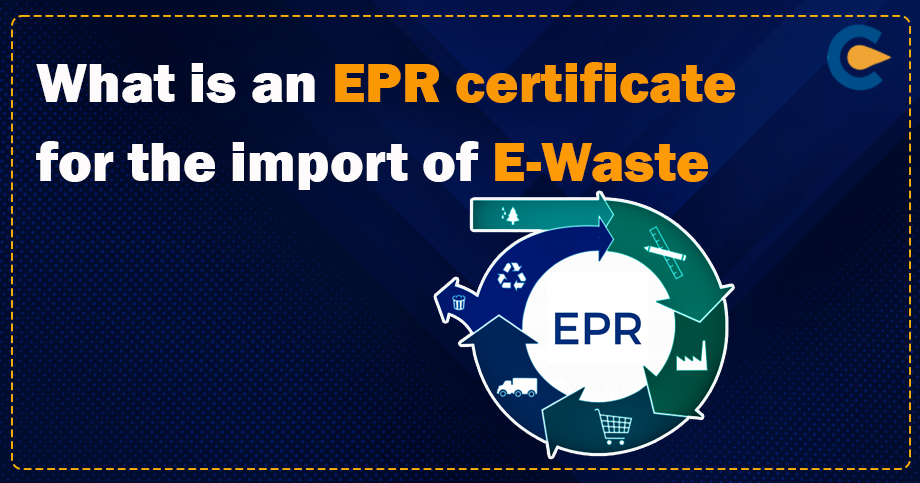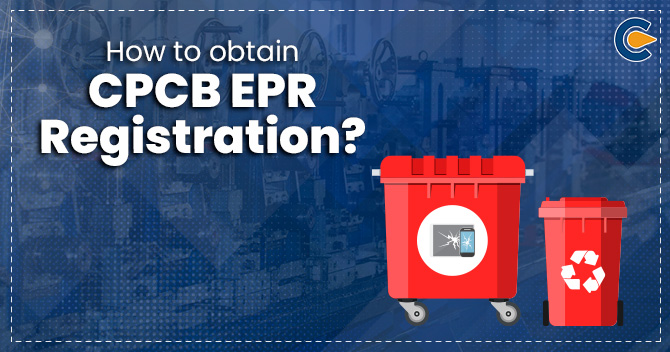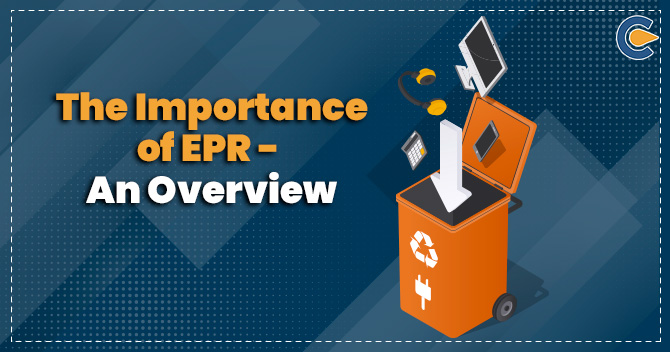Every year, tonnes and tonnes of e-Waste are illegally imported and dumped in India, making it difficult for authorities to properly manage and regulate the ever-growing collection of WEEE (Waste Electrical or electronic equipment). This has been recently addressed by many national and international authorities as one of the biggest reasons for growing waste in developing nations like India. University Therefore, now, Indian authorities like the Ministry of Environment, Forest and Climate change require proper authorisation for import that to in limited conditions. One of which is acquiring an EPR certificate for the import.
Evolution of EPR
Extended Producers’ Responsibility is defined as the responsibility delegated to producers’/importers or manufacturers relating to proper management of their products till the end-of-life cycle. It is an extension of the “Polluters pay principle” that encourages a “cradle to cradle” approach.
The Extended Producers’ Responsibility was introduced by Sweden’s Thomas Lindqvist, who is in 1990 for one of the Sweden University, which was later introduced to the Swedish Ministry of Environment. This report defining the concept of EPR was introduced at the time when many European countries were implementing policies to improve their waste management system. Ultimately seeing the innovative idea behind EPR, all of the signatories of the Organization for Economic Co-operation and Development (OECD)[1] adopted this policy as an international standard for the prevention of pollution and waste management.
Germany was among the first country to adopt the policy of EPR in Europe in 1991, making manufacturers and producers responsible for waste management of the products they sell, including recycling and disposing of them. In India, Extended Producers’ Responsibility was first introduced in E-Waste Management Rules and Plastic Waste Management Rules through the amendment of 2016. Under these rules, EPR is defined as the responsibility of any producer of plastic or EEE (Electrical or electronic equipment) for the management of those waste in order to make sure that it is disposed of in an environmentally sustainable way.
Import of E-Waste
India is one of the biggest producers’ of E-Waste and has partially banned the import of E-Waste from regulating the influx of WEEE (Waste Electrical or electronic equipment) in India. In a recent report, the Union Government reported Lok sabha of 29 illegal cases of E-Waste import since 2019. Therefore to curb this and make importers and producers responsible for waste, the import of E-Waste in India is only limited to importers who are importing WEEE (Waste Electrical or electronic equipment) to sell to the authorised producer.
E-Waste Management rules, 2016 dictate regulations regarding Import which include:-
- Electric and Electronic Equipment (EEE) is only required to be imported to the importers or producers having Extended Producers’ Responsibility authorisation that is permitted given by CPCB (Central Pollution Control Board) as specified under Section 5(3) of the E-Waste (Management) Rules, 2016.
- The importers also have to submit the Extended Producers’ Responsibility action plan once they have submitted the authorisation certificate.
EPR certificate for the import of E-Waste
The authorisation for Extended Producers’ Responsibility has been made compulsory for all the producers, including importers.
Except for in the case where the import is happening for selling it to EPR Authorised producers. For which importers only need documents to deposit it to Custom/port authorities the following documents:-
- Copy of agreement with EPR registered producers’
- Copy of Extended Producers’ Responsibility authorisation of the Producers’
- Letter from EPR-Authorised Producers on behalf of which importer is importing
The second exception is when actual users are importing spares of EEE from OEM (Original Equipment Manufacturers) for a reason relating to a warranty replacement, with the condition that an equal number of malfunctioning or default parts are exported back within a year according to the document verification by custom authorities specified under Schedule VIII of Hazardous Waste Rules, 2016.
Documents required for an EPR certificate for the import of E-Waste
The documents that are required for acquiring an EPR certificate for the import of E-Waste of E-Waste are: –
- IEC
- Authorized Signatory KYC
- the rent or lease proof
- EPR Plan,
- Awareness Plan
- Details on Waste handled
- Conformity with the RoHS.
Procedure for EPR certificate for the import of E-Waste
Importers under E-Waste management rules are clubbed together with producers’ in case of acquiring an EPR certificate for the import of E-Waste. The application process is similar to that followed by producers’ which includes: –
- The application under Form 1 is to be filled by the importer
- Details on E-Waste production of EEE (Electric or Electronic equipment) item-wise are to be specified along with projected target collection for the impending year by the State Pollution Control Board.
- Extended Producers’ Responsibility action plan info needs to be provided.
- The application form for the EPR certificate for the import of E-Waste submitted should accompany the required document.
- Once the submission, the application will be examined by Central Pollution Control Board.
- After inspecting the application, CPCB will provide the EPR Certificate.
Self-Declaration form for EPR certificate for the import of E-Waste
The self-declaration form that is to be filled by importers as per the E-Waste management Rules contains the basic information of the producers, including: –
- Company Name with Complete Address from where business/sale in the entire country is being managed
- Name of Authorised Person
- Email:
- Telephone:
- Fax:
- Mobile Number:
- Complete Postal Address:
- Brand name (if any)
Post Compliance Relating to EPR certificate for the import of E-Waste
Importers, according to the guidelines provided by MoEF and CC (Ministry of Environment, Forest and Climate Change), have to comply with some of the requirements as part of their Extended Producers’ Responsibility. These are: –
- They have to submit an annual return as per form 3
- They also have to submit an annual report in regards to the implementation of Extended Producers’ Responsibility which will be compiled by the State Pollution Control Board/Pollution Control Committee and submitted to the Central Pollution Control Board.
- The report by SPCB/PCC will be further compiled by Central Pollution Control Board in order to make a final submission to the Ministry of Environment, Forest and Climate Change.
Cancellation of EPR Certificate for the Import of E-Waste
The Central Pollution Control Board verifies the documentation submitted by the Importers during the filing of an application. If this documentation is faulty or false, the authorisation can be cancelled. Along with this, if at any point time the importers are discovered to have violated any regulation stipulated under the rules or the guidelines provided by Central Pollution Control Board, the notice is issued by the authorities immediately.
Conclusion
Import of E-Waste has proven to be a delicate subject due to a large amount of illegal importing of E-Waste from developing countries in spite of regulations present in both international as well as domestic legislation. EPR certificate for the import of E-Waste not only levies responsibility on importers relating to the management of their products but also regulates the uncontrolled influx of illegal e-waste in India.
Read our Article:EPR Plan for Plastic Import in India











